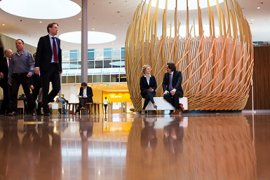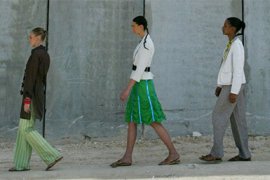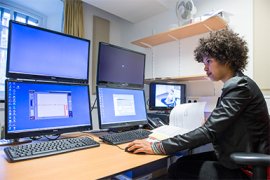Research
Research within the Faculty of Humanities is grouped into four research institutes:

Institute for Cultural Inquiry
We focus on the role of art, culture and media in contemporary society.

Institute for Language Sciences
We explore how language functions in our society.

Research Institute for Philosophy and Religious Studies
We conduct research in the areas of philosophy and religion.

Research Institute for History and Art History
We explore historical and art historical issues.
Research Areas
With our expertise, we contribute to analysing and solving issues in society, science and scholarship in the following areas:
University-wide themes
Utrecht University has four strategic research themes and eleven research focus areas, in which academics from different fields of study cooperate on an integrated approach to current issues. Humanities scholars participate in the following themes in particular:
| What makes a society open and resilient? | What is the contribution made by institutions – the formal and informal rules of human action – to long-term prosperity, equality and democracy? This research is carried out within the strategic theme Institutions for Open Societies. |
|---|---|
| Early childhood & Becoming adults in a changing world | What is the importance of (very) early life experiences on child development and the unfolding of human behaviour? And how can young people develop into well-balanced adults in a rapidly-changing society? Both research topics are addressed within the strategic theme Dynamics of Youth. |
| Towards a sustainable society | How can we make the transition towards a society that is ecologically, economically and socially balanced? This research is carried out within the strategic theme Pathways to Sustainability. |
| Governing the digital society | The focus area Governing the Digital Society explores administrative issues surrounding digitisation. For example: can the Netherlands develop an alternative to Facebook? |
| Impact of migration | Questions about migration and changing societies are addressed within the focus area Migration and Societal Change. The focal point is migration between and to European countries in the 20th and 21st centuries. |
| Understanding artificial intelligence | Can humans make friends with robots? What can a hologram do for long-distance communication? These are questions being explored by researchers in the focus area Human-centered Artificial Intelligence. |
| Development of data science techniques | How can we accelerate the development of data science techniques in research areas where they are not yet applied? This research is carried out within the focus area Applied Data Science. |
| Driven by data | Research and education initiatives in which data play a role are carried out within the interdisciplinary platform Driven by data. |
| Serious gaming and playful interaction | How can games inform, motivate, appeal to emotion, and influence behavior? This research is carried out within the focus area Game Research. |
| Take on new challenges | How can professionals effectively anticipate the changing nature of professional work? This research is carried out within the focus area Professional Performance. |
| A great example of team play | What new knowledge can sports yield about co-creating public value? This research is carried out within the focus area Sports and Society. |
| Transition to a sustainable food chain | How can we develop food and eating habits that are healthy for both people and the planet? This research takes place in the Future Food Utrecht focus area. |






















